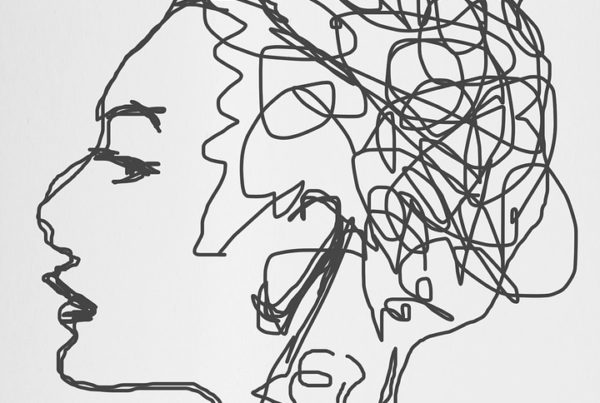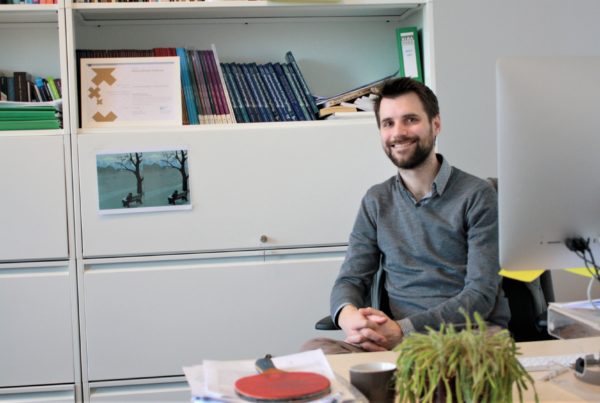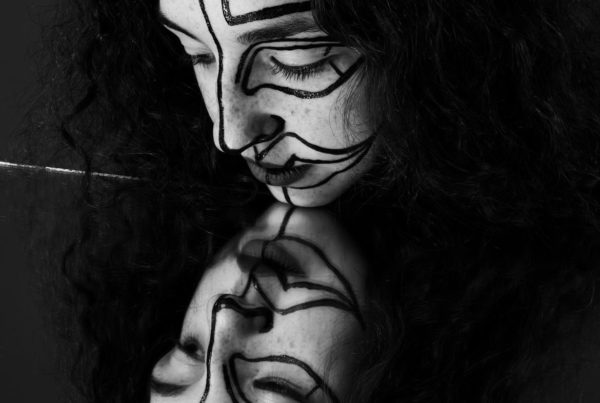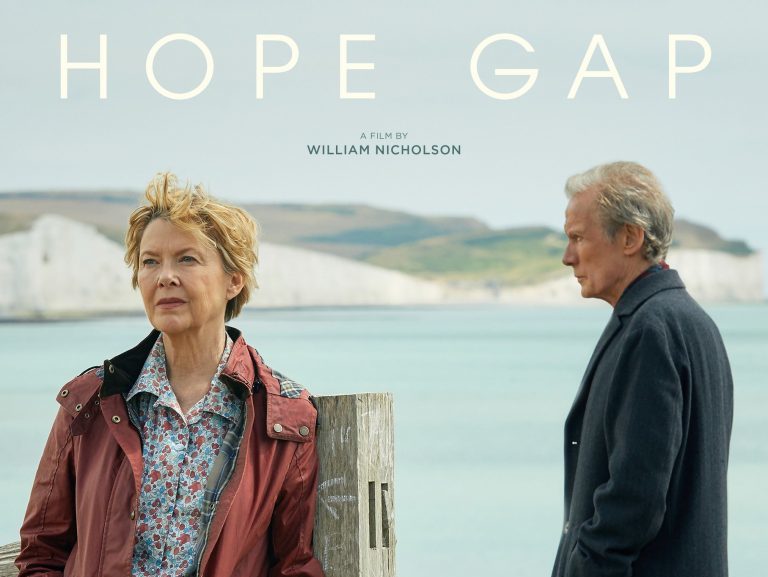
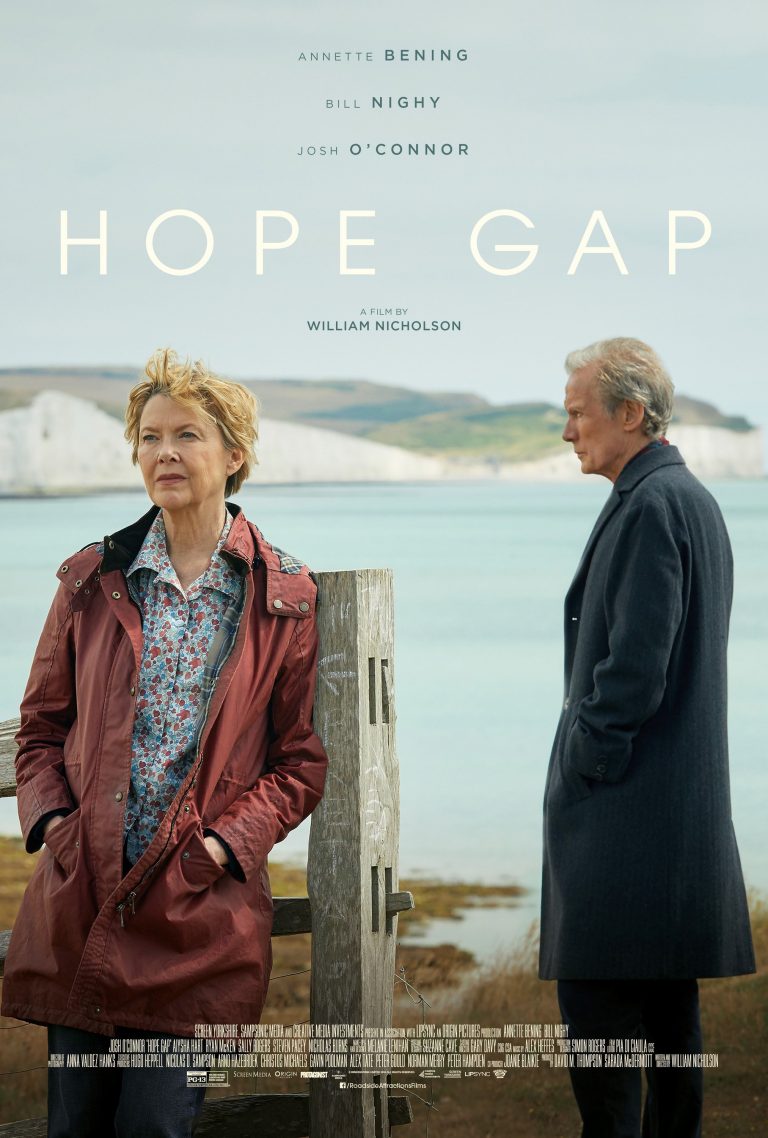
Divorce dramas don’t need an innovative story-line to succeed. The sheer emotional violence that leaves the former lovers heartbroken is often enough to immerse the viewer in the unfolding romantic catastrophe. While Hope Gap arguably does not achieve this high level of tragic drama to the same extent as last year’s Marriage Story, it gives us carefully constructed characters, a compelling insight into the ailing marriage between the two protagonists, and a subtle moral of the story.
Hope Gap tells a familiar tale: After 29 years of marriage, the introverted Edward (Bill Nighy) decides to leave his quarrelsome wife Grace (Annette Bening) for another woman. Their adult son (Josh O´Connor), a bystander in the conflict, tries not to take anyone’s side. Stubborn denial, a legal settlement, and eventual coping follow.
Grace’s love for poetry is somewhat of a running narrative throughout the movie; reciting poetic lines with allegorical meanings that correspond to each event in the film. In fact, the entire movie attempts to be a kind of poem in itself, but unfortunately, we see more of an awkward try rather than a piece of art. The screenplay might be multifaceted and nuanced, but the continuous impression that the movie is trying too hard to be award-worthy makes all its attempts at being an artistic masterpiece fall flat.
Bening’s performance as Grace is a prime example of this. She portrays her forthright character with eloquence and passion, but she seems to be somewhat miscast for her role. As a consequence, when seeing Grace on screen, we see an actress overacting her role rather than an actress truly embodying an intriguing character. Analogously, her British accent sounds more like the accent an American would have when trying to speak British English rather than the accent that a true Brit would have. On the contrary, Nighy succeeds at giving a kind of gravitas to his character that feels natural through and through.
Luckily, this does not change the fact that there is a both fascinating as well as distinctively human interplay between husband and wife that gives us a glimpse into the motivations that underlie their conflict. Edward is reserved and withdrawn, while Grace aggressively tries to get him to speak his mind about his emotions. Yet, as she fails to truly listen to his feelings, she only achieves the opposite. The more she nags and shouts, the more he keeps to himself. When he finally tells her that he is going to leave, she is desperate; how could he break up with her, from one day to the next, after years of what she thought was a happy marriage? How could he not give her a second chance? Everything seemed to be perfect, but appearances are deceiving.
The moral of the story, as it seems to me, is that – sometimes – it is crucial that the appearance actually shows what’s underneath the surface. In a relationship, this is certainly the case. If a marriage takes the wrong turn, why wait until it’s too late to go back? Edward, calm and introverted, knew for a long time that things were not going well; and yet he didn’t tell his wife any of it. The unfortunate interplay between their personalities – his reclusiveness and her assertiveness – leads him to share fewer and fewer of his personal thoughts and feelings, up until the point at which there is no turning back. There is no clear culprit in the conflict that inevitably ensues – just a reminder that total honesty and a good-hearted willingness to listen are necessary to keep a romantic relationship as the harmonious and wonderful bond that it is.
Directed by: William Nicholson
This movie is out March 12 in a cinema near you.

Divorce dramas don’t need an innovative story-line to succeed. The sheer emotional violence that leaves the former lovers heartbroken is often enough to immerse the viewer in the unfolding romantic catastrophe. While Hope Gap arguably does not achieve this high level of tragic drama to the same extent as last year’s Marriage Story, it gives us carefully constructed characters, a compelling insight into the ailing marriage between the two protagonists, and a subtle moral of the story.
Hope Gap tells a familiar tale: After 29 years of marriage, the introverted Edward (Bill Nighy) decides to leave his quarrelsome wife Grace (Annette Bening) for another woman. Their adult son (Josh O´Connor), a bystander in the conflict, tries not to take anyone’s side. Stubborn denial, a legal settlement, and eventual coping follow.
Grace’s love for poetry is somewhat of a running narrative throughout the movie; reciting poetic lines with allegorical meanings that correspond to each event in the film. In fact, the entire movie attempts to be a kind of poem in itself, but unfortunately, we see more of an awkward try rather than a piece of art. The screenplay might be multifaceted and nuanced, but the continuous impression that the movie is trying too hard to be award-worthy makes all its attempts at being an artistic masterpiece fall flat.
Bening’s performance as Grace is a prime example of this. She portrays her forthright character with eloquence and passion, but she seems to be somewhat miscast for her role. As a consequence, when seeing Grace on screen, we see an actress overacting her role rather than an actress truly embodying an intriguing character. Analogously, her British accent sounds more like the accent an American would have when trying to speak British English rather than the accent that a true Brit would have. On the contrary, Nighy succeeds at giving a kind of gravitas to his character that feels natural through and through.
Luckily, this does not change the fact that there is a both fascinating as well as distinctively human interplay between husband and wife that gives us a glimpse into the motivations that underlie their conflict. Edward is reserved and withdrawn, while Grace aggressively tries to get him to speak his mind about his emotions. Yet, as she fails to truly listen to his feelings, she only achieves the opposite. The more she nags and shouts, the more he keeps to himself. When he finally tells her that he is going to leave, she is desperate; how could he break up with her, from one day to the next, after years of what she thought was a happy marriage? How could he not give her a second chance? Everything seemed to be perfect, but appearances are deceiving.
The moral of the story, as it seems to me, is that – sometimes – it is crucial that the appearance actually shows what’s underneath the surface. In a relationship, this is certainly the case. If a marriage takes the wrong turn, why wait until it’s too late to go back? Edward, calm and introverted, knew for a long time that things were not going well; and yet he didn’t tell his wife any of it. The unfortunate interplay between their personalities – his reclusiveness and her assertiveness – leads him to share fewer and fewer of his personal thoughts and feelings, up until the point at which there is no turning back. There is no clear culprit in the conflict that inevitably ensues – just a reminder that total honesty and a good-hearted willingness to listen are necessary to keep a romantic relationship as the harmonious and wonderful bond that it is.
Directed by: William Nicholson
This movie is out March 12 in a cinema near you.

